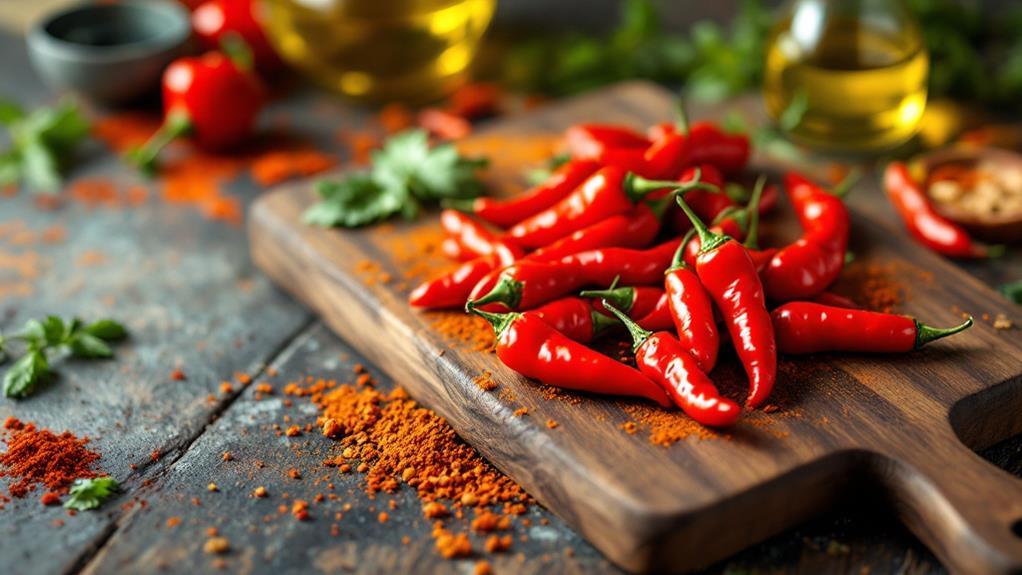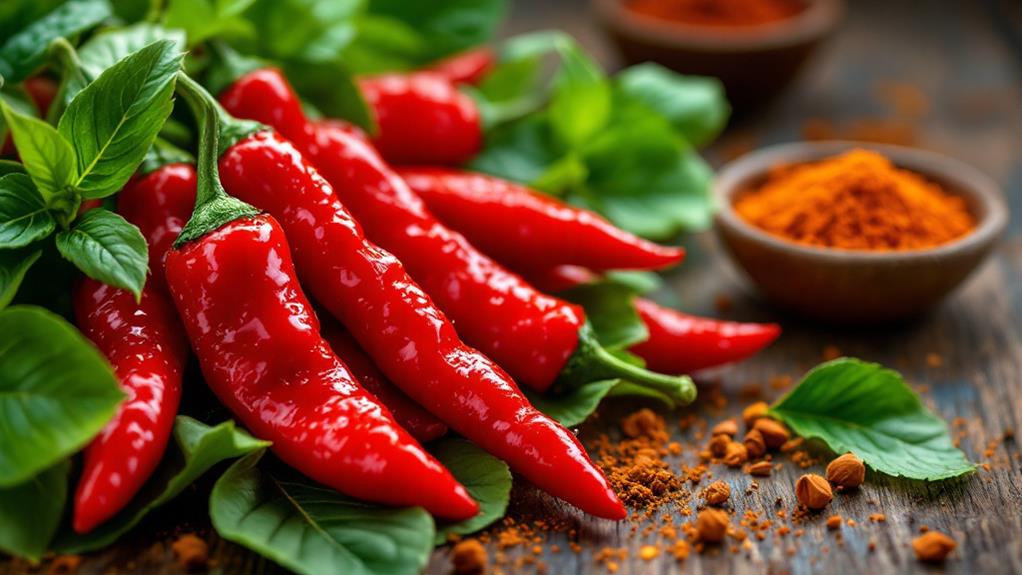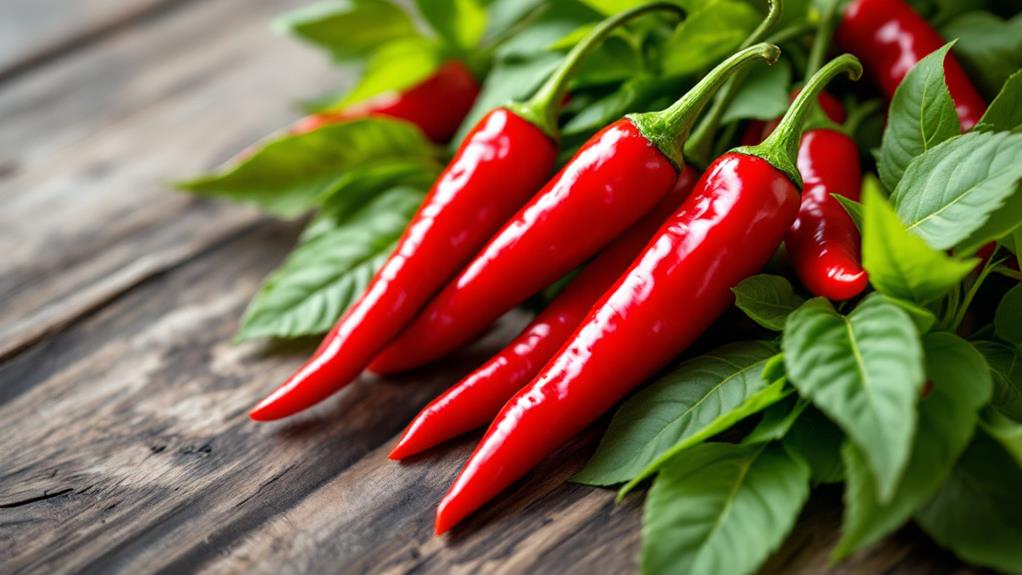The Cayenne Pepper: Health Benefits, Uses, and Recipes

Cayenne pepper, known for its intense heat, doesn't just spice up dishes; it's a nutritional powerhouse with numerous health benefits. It contains capsaicin, which alleviates pain, elevates metabolism, and improves cardiovascular health by lowering blood pressure and cholesterol. Rich in vitamins A, C, and E, it boosts immune function and supports eye health. In the kitchen, use it to add flavor to soups, stews, and roasted vegetables, or get creative and try it in breakfast dishes or beverages. Just handle with care to avoid irritation. There's more to uncover about this versatile spice and how it can transform your meals.
What Is Cayenne Pepper
Cayenne pepper, known scientifically as Capsicum annuum, packs a punch as a long, thin red chili pepper cherished for its intense heat, which can hit between 30,000 and 50,000 Scoville Heat Units (SHU). Originating in Central and South America, this fiery ingredient has become a staple in diverse cuisines worldwide, including Cajun, Creole, and Ayurvedic traditions.
You might be surprised to learn that cayenne pepper isn't just about heat. It's a powerhouse of vital nutrients, offering vitamins A, C, and E, all of which play a significant role in maintaining your health. These vitamins are also potent antioxidants, helping your body combat oxidative stress and reducing the risk of chronic diseases. The primary active component, capsaicin, not only gives cayenne its spicy flavor but also contributes to its impressive health benefits.
In the kitchen, you'll find cayenne pepper available in both fresh and dried forms. It's used in recipes to spice up soups, stews, and marinades, adding both flavor and heat. As you investigate spicy foods, remember the lively red chili pepper from its Central and South American roots, making your dishes both flavorful and nutritious.
Health Benefits
Over the years, research has highlighted the remarkable health benefits of cayenne pepper, primarily due to its rich content of capsaicin and powerful antioxidants. Capsaicin in cayenne pepper plays a significant role in pain relief by reducing substance P, a pain signal carrier, making it particularly effective for conditions like osteoarthritis. The spicy foods you consume, like cayenne pepper, may also improve your digestive health. Capsaicin stimulates digestive fluids, helping alleviate symptoms of indigestion and bloating.
The antioxidants in cayenne pepper, including vitamins A, C, and E, are instrumental in supporting immune function. These antioxidants help fend off diseases, potentially reducing your risk of developing cancer or heart disease. If you're looking to improve your cardiovascular health, cayenne pepper might be your ally. This fiery spice can boost circulation, lower blood pressure, and reduce cholesterol levels, all contributing to comprehensive heart health.
For those interested in weight management, cayenne pepper offers extra benefits. Regular consumption has been linked to increased metabolic rates, promoting fat oxidation and reducing appetite. Embracing cayenne pepper in your diet could be a flavorful way to support your health expedition.
Nutritional Profile

Beyond its impressive health benefits, you'll find that cayenne pepper boasts a remarkable nutritional profile. This fiery spice is surprisingly low in calories, with just 18 calories per 45-gram serving, making it an excellent supplement to any diet without contributing to calorie overload. Cayenne pepper benefits your body by offering a rich nutrient content, including high levels of vitamin C and provitamin A. Specifically, it provides 72% of your daily value for vitamin C, which supports immune function, and 48% of provitamin A, essential for maintaining eye health and overall wellness.
In terms of macronutrients, cayenne pepper delivers 1.5 grams of protein, 0.33 grams of fat, and 6.5 grams of carbohydrates per serving. It also includes 1 gram of dietary fiber, aiding digestion and promoting gut health. Furthermore, this spice is packed with antioxidants like flavonoids and carotenoids, which combat oxidative stress and improve overall health. Fresh cayenne peppers, in particular, surpass their dried counterparts in nutrient content, making them a superior choice for enhancing your nutrient intake. Incorporating fresh cayenne peppers into your diet can remarkably raise your health journey.
Culinary Uses
Incorporating cayenne pepper into your culinary creations can transform ordinary dishes with its lively heat and depth of flavor. Its culinary uses are extensive, making it an ideal supplement to a range of recipes. When you toss it into soups and stews, cayenne pepper not only improves flavor but also reduces the need for extra salt, which can benefit your heart health.
Sprinkling ground cayenne over roasted vegetables creates a spicy twist that amplifies both flavor and nutritional value. If you're up for experimenting, try mixing it into hummus or using it in marinades for a bold kick. Fresh cayenne peppers sautéed with other vegetables bring a dynamic heat to your plate, making any meal more exciting.
For breakfast or brunch, incorporating cayenne into scrambled eggs or fish tacos adds an unexpected layer of spice that complements savory flavors beautifully. And don't just limit it to food – adding a pinch to hot chocolate or lemonade gives these drinks a sweet-spicy flavor profile that's both intriguing and satisfying. With its versatility, cayenne pepper is a must-have in your spice rack for creating spicy foods that delightfully improve flavor and nutrition in your meals.
Safety and Precautions

When using cayenne pepper, a little caution goes a long way to guarantee a safe and enjoyable experience. Overconsumption can lead to digestive discomfort, particularly if you have GERD or IBS. Symptoms like upset stomach and heartburn are common side effects. To prevent these issues, practice moderation. High doses can cause more severe side effects, such as an irregular heartbeat and increased blood pressure, so it's essential to control your intake.
Handling raw cayenne peppers requires precautions. Capsaicin oil, responsible for the heat, can cause skin irritation and is difficult to wash off. Always wear gloves and wash your hands thoroughly after handling to avoid a burning sensation. If contact with your eyes occurs, it can result in burning and redness, so take care. Vinegar can help remove capsaicin from your skin if soap and water aren't enough.
Allergic reactions to cayenne pepper are rare but can be serious. If you experience hives, swelling, or difficulty breathing, seek immediate medical attention. Remember, while cayenne pepper offers many health benefits, being aware of these potential issues guarantees you use it safely and effectively.




